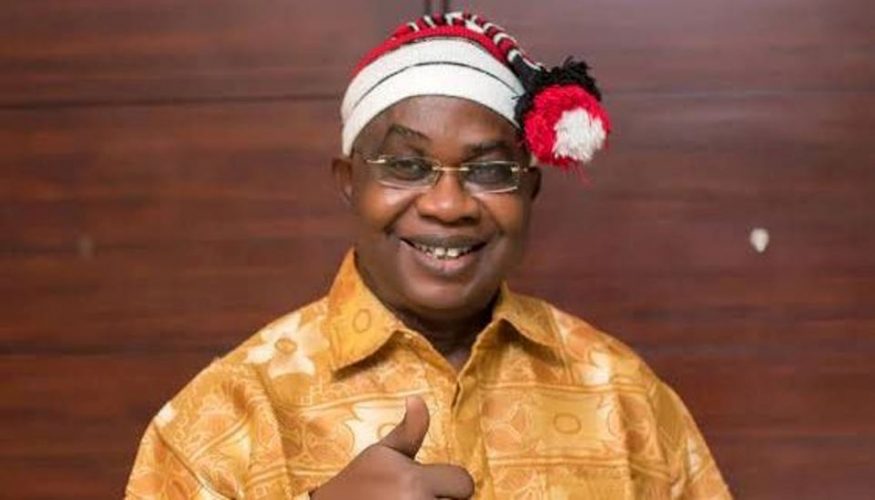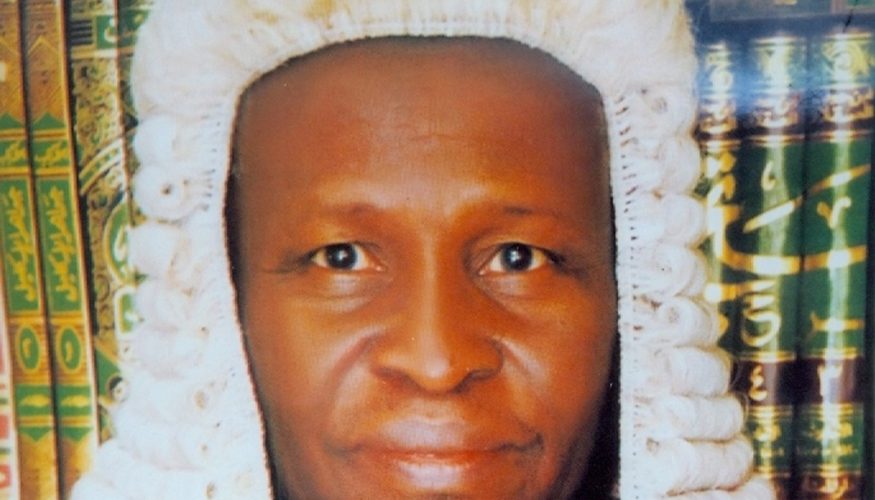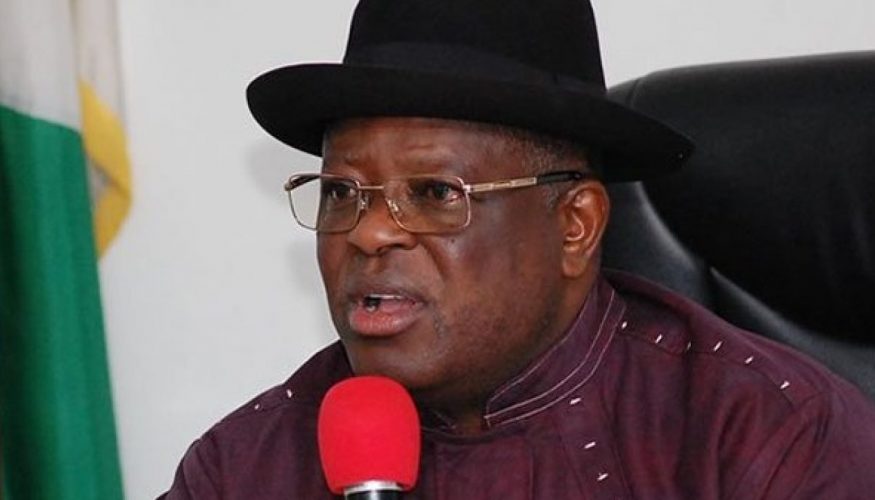In this article, AKINTAYO BALOGUN, an Abuja based lawyer, asserts that there are several issues plaguing the legality and/or sustainability of the order of an Abakaliki High Court directing that Ebonyi State Governor Dave Umahi and his deputy must not be removed from office
On 10th March 2022, we were greeted with an Order granted Ex-parte (without hearing the other side), by a High Court of Justice sitting in Abakiliki, Ebonyi State (curiously filed just on 9th March 2022), wherein the Honourable Court in Suit No. HAB/13/2022 and vide Motion No: HAB/135M/2022, granted the prayers of the Defendants/Applicant as follows:
An interim order of this Honourable Court for seven days (7 days) (subject to renewal) is hereby granted, in view of its judgment in Suit No. HAB/13/2022 delivered on 28th day of February, 2022, being a judgment in rem, and having precedence over any subsequent contrary judgment. The Applicants hereto, Engr. David Nweze Umahi and Dr. Eric Kelechi Igwe shall accordingly remain and not be removed from office as governor and deputy governor of Ebonyi State respectively
It is easily deducible that this Ex-parte Order was made by the Ebonyi State High Court, following the judgment of the Federal High Court sitting in Abuja which had on the 8th Of March, 2022, declared the seat of the Governor, Deputy Governor, and 17 members of the House of Assembly vacant, following their defection to the All progressive Congress from the Peoples Democratic Party, a party under which they had been sponsored and elected to fill the various political seats in Ebonyi State. The Governor had informed a crowd the day after the judgment was delivered that he had hired a team of 17 SANs to prosecute an Appeal against the Judgement of the Federal High Court. However, while the said Appeal is believed to have been commenced, the same Engr. David Nweze Umahi and Dr. Eric Kelechi Igwe, addressed as Defendants/Applicants went gone back to the Ebonyi State High Court which had earlier on delivered a divergent Judgement to that of the Federal High Court, to seek and obtain the above-quoted reliefs, vide an Ex-parte application. We note that it is the same Suit Number that is contained in the heading of the instant Ex-parte Order that is also contained in the Judgement that had been earlier delivered on the 28th Day of February 2022 as stated in the Order. This means that it is one and the same suit where judgment had been earlier delivered that this Ex-parte Order is also being made and granted.
Several issues as to the legality and/or sustainability of the said Order have reason among pundits. We shall discuss these issues under the following subheads/issues for determination.
- Whether or not the Court ordinarily has not become functus officio upon the delivery of the judgment.
- Whether the Order made by the court does not amount to sitting on Appeal on its own judgment.
- Whether the Order made does not amount to a stay of execution of the Judgement of the Federal High Court sitting in Abuja
- Whether the declaration “An interim order of this Honourable Court for seven days (7 days) (subject to renewal ) is hereby granted, in view of its judgment in Suit No. HAB/13/2022 delivered on 28th day of February 2022, being a judgment in rem, and having precedence over any subsequent contrary judgment” does not amount to an attempt to oust the jurisdiction of any other court including a higher court.
- Whether the Court ordinarily has not become functus officio upon the delivery of the judgment.
It is a notorious fact that once a judgment is delivered, the Court becomes functus officio (that is, it has no power whatsoever to say or do anything in respect of the decision already made). They ordinarily have no powers to do or say anything in respect of the case again except to entertain certain applications as applicable under the rules of the honourable court.
Functus Officio was defined in the case of Buhari Vs INEC & Ors (2008) LPELR – 814 SC, where the Supreme Court held that a task performed; having fulfilled the function, discharged the office, or accomplished the purpose, and therefore of no further or authority. In the case of Chief Ozo Nwankwo Alor & Anor. Vs Christopher Ngene & Ors (2007) LPELR – 431 (SC); (2007) 17 NWLR (Pt.1062) 163, the Supreme Court said of functus officio: “A final order envisages that it is a permanent order made by the Court and the parties in respect of whom or against whom the order is made, cannot go back to the same Court to challenge or change that order. That Court, by virtue of the order, is functus officio and the only option open to the parties is by way of appeal against the order. This means that the rights of the parties have been determined to finality, and they cannot go back to the same Court on those rights.
It is an undebatable fact that the State High Court in Ebonyi which had earlier delivered a judgment in the same suit with Suit No HAB/13/2022, constituting the same parties, have become functus Officio, immediately upon the delivery of its judgment on the 28th of February 2022. The court has no business whatsoever in respect of the suit except to conduct a garnishee proceeding in respect of the monetary aspect of the judgment or to hear an application for stay of execution of the judgment. It is respectfully submitted that whatever statement, Order, or instruction, given by the same court, which are not contained in the type as envisaged under the rules of the honourable court are to all intents and purposes invalid and the court should immediately set it aside when it has the opportunity to do so. In this instant case, the final judgment was delivered on 28th February 2022. The court had no business whatsoever hearing any application that seeks to reinforce its earlier judgment. The judgment is already in force. What then necessitated this fresh order from a court when nothing has arisen within its ranks to change its judgment is still a thing of concern? As a matter of fact, the Ex-parte Order which seeks to reinforce the judgment the Ebonyi High court had earlier delivered, has no place in law. It is strange and unknown to the practice of law.
- Whether the Order made by the court does not amount to sitting on Appeal on its own judgement.
The decision of the Ebonyi State High Court to make an Order reinforcing its earlier decision or making any pronouncement whatsoever in respect of an already decided case is the same as a court sitting on appeal over its own decision, whether in making a contrary statement or in reinforcing its judgment. The new Order made by the court will now open a flood gate of applications and submissions and room for a fresh argument on an already decided action. This ought not to be. The Court of Appeal held in thus case of EDO STATE HOUSE OF ASSEMBLY & ORS v. AGBEBAKU CITATION: (2018) LPELR-45056(CA)
“The general position of the law is that a Court cannot set aside its decision or the decision of a Court of coordinate jurisdiction made on the merits. However the Court has inherent power to set aside its decision when same are later found to be a nullity, obtained by fraud or mistakenly given under the impression of parties’ consent. That power does not extend to a Court sitting on appeal over its own decisions.
The Order of the Ebonyi State High Court under review does not seek to nullify its judgment, nor does the issue of fraud or mistaken impression arise. There is no basis for the said Order. The Court most respectfully has taken a decision to sit on Appeal over its own decision. What business has a court that has delivered judgment in favour of a particular party have in delivering another Ex-parte Order to reinforce its judgment?
- Whether the Order made does not amount to a stay of execution of the Judgement of the Federal High Court sitting in Abuja
As earlier stated, it is easily deducible that this Ex-parte Order was given since there is a divergent judgment coming from the Federal High Court, sitting in Abuja. Now the Court in Abakiliki held thus:
“The Applicants hereto, Engr. David Nweze Umahi and Dr. Eric Kelechi Igwe shall accordingly remain and not be removed from office as governor and deputy governor of Ebonyi State respectively”
This Order is a direct contrast and opposite to the Order of the Federal High Court in Abuja which had held that the as governor and deputy governor of Ebonyi State, having defected from the party on which platform they won the election, are deemed to have resigned their offices. The court in Abuja further ordered the Independent National Electoral Commission (INEC) to accept from PDP names of its members to replace the governor and deputy governor of Ebonyi State to serve out the remaining part of their tenure or, alternative, conduct a fresh election to replace the governor and deputy governor of Ebonyi State. Until there is an Order for a stay of execution of this judgment, issued by the very court that delivered the judgment or by a higher court, this judgment remains the law that ought to be obeyed. In the practice of law in Nigeria, an application to stay the execution of a judgment, is usually made to the same court that had earlier delivered the judgment. This is why the application is made simply by filing a motion and not an Originating process. Another court with coordinate jurisdiction, cannot order parties to directly disobey a judgment of a court, and worst still after judgment had been delivered on both sides. See Order 31 Rule of the Federal High Court Civil procedure Rules 2019. See also Order 54 Rule 1 of the Ebonyi State High Court Civil Procedure Rules 2008.
A State High Court, making an order that technically stays the execution of the judgment of a Federal High Court is a strange practice, unknown to law and unpracticable.
- Whether the declaration “An interim order of this Honourable Court for seven days (7 days) (subject to renewal ) is hereby granted, in view of its judgment in Suit No. HAB/13/2022 delivered on 28th day of February, 2022, being a judgment in rem, and having precedence over any subsequent contrary judgment” does not amount to an attempt to oust the jurisdiction of any other court including a higher court.
We respectfully submit that simply stating that the Ex-parte order of this Ebonyi State High Court has precedence over any subsequent contrary judgment” without specifically stating which court it has precedence over is an attempt by the court to oust the jurisdiction of any other court, INCLUDING a superior court. Ordinarily, the only court that can set aside this instant order, is the Court that granted it based on certain grounds or a higher court. However, stating plainly that this Ex-parte Order of the Ebonyi State High Court has precedence over any subsequent contrary judgment automatically means that whoever gives a contrary judgment, ruling or opinion, whether a lower court, court of coordinate jurisdiction or a higher court, same is invalid and should be discountenanced. This we most respectfully submit is an enormous gaffe from the State High Court. How do you use such an Order to oust any other subsequent Order or judgment, without specifying or limiting who the subsequent Order is coming from? What makes the judgment have precedence over any subsequent contrary judgment? The use of the phrase “any other subsequent Order” is too wide, too lose, and dangerous.
Conclusion
We must state with the utmost respect to the Counsel and to the court that the processes filed before the Ebonyi State High Court that had earlier delivered a judgment, amounts to an abuse of court process and same must be disconnected from the practice of law in Nigeria. The Court cannot afford to continually receive, produce or argue documents that are unknown to the practice of law in Nigeria.
The courts must do all that is necessary to protect its integrity and appellation with jealousy. The courts cannot allow themselves to be tossed around like a game of chess or allow themselves to be controlled by the winds of time. It is popularly said that whenever a matter is brought before a court of competent jurisdiction for determination, it is not the parties that are on trial but the judiciary. The judiciary must always come out with its head up high. Additionally, legal practitioners should endeavour to advise their clients appropriately and not to allow the desperation of litigants and especially politicians to determine their line and style of practice. Within a few years, the politicians you see today will be gone or would have lost political relevance, but the legal profession spans an entire lifetime. The few pleasures and earnings of the moment should not be allowed to put an indelible stain on the profession. I hope the judiciary can retrace its steps on this issue.
Akintayo Balogun Esq., LL.B (Hons), BL, LL.M, is a legal practitioner based in Abuja, FCT. akinson6@gmail.com.
To join our Telegram platform, please click here
Copyright 2020 CITY LAWYER. Please send emails to citylawyermag@gmail.com. Join us on Facebook at https://web.facebook.com/City-Lawyer-Magazine-434937936684320 and on TWITTER at https://twitter.com/CityLawyerMag. All materials available on this Website are protected by copyright, trade mark and other proprietary and intellectual property laws. You may not use any of our intellectual property rights without our express written consent or attribution to www.citylawyermag.com. However, you are permitted to print or save to your individual PC, tablet or storage extracts from this Website for your own personal non-commercial use. The views expressed in this article are entirely those of the author and do not necessarily reflect
CITY LAWYER cannot guarantee the completeness, accuracy of the data and content of the website, nor that it is up to date at all times. CITY LAWYER accepts no liability for any direct or indirect damage of any kind whatsoever that arises from, or is in any way related to the use of the website or its accessibility or lack thereof. The assertions and opinions expressed in articles, announcements and/or news on this website reflect the views of the author(s) and do not (necessarily) reflect the views of the webmaster, the internet provider or CITY LAWYER. CITY LAWYER can in no way whatsoever be held responsible for the content of such views nor can it be held liable for any direct or indirect damage that may arise from such views. CITY LAWYER neither guarantees nor supports any product or service mentioned on this website, nor does it warrant any assertions made by the manufacturers or promoters of such products or services. Users of this website are always recommended to obtain independent information and/or to perform independent research before using the information acquired via this website.


